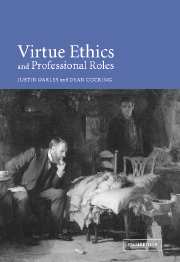Book contents
- Frontmatter
- Contents
- Preface
- Acknowledgements
- Introduction
- 1 The nature of virtue ethics
- 2 The regulative ideals of morality and the problem of friendship
- 3 A virtue ethics approach to professional roles
- 4 Ethical models of the good general practitioner
- 5 Professional virtues, ordinary vices
- 6 Professional detachment in health care and legal practice
- Bibliography
- Index
5 - Professional virtues, ordinary vices
Published online by Cambridge University Press: 22 September 2009
- Frontmatter
- Contents
- Preface
- Acknowledgements
- Introduction
- 1 The nature of virtue ethics
- 2 The regulative ideals of morality and the problem of friendship
- 3 A virtue ethics approach to professional roles
- 4 Ethical models of the good general practitioner
- 5 Professional virtues, ordinary vices
- 6 Professional detachment in health care and legal practice
- Bibliography
- Index
Summary
PROFESSIONAL ROLES AND BROAD-BASED ETHICAL THEORY
The development of systematic professional ethics in the 1970s saw the traditional norms and entrenched practices in many professions being scrutinised and revised in the light of general ethical theories such as utilitarianism and Kantianism, and more recently, virtue ethics has been employed in a similar way. So, in medicine, for example, doctors have been told that rather than paternalistically withholding treatment information from patients, they must inform patients about the risks of medical procedures, since doing so respects patients' rights, maximises utility, or is required by the virtue of honesty. As we noted in the previous chapter, various writers have argued in support of such uses of broad-based ethical theories, whereas other writers have criticised the idea that the legitimacy of professional norms and practices should be judged directly in terms of what broad-based ethical theories would require. On the latter approach, for instance, Michael Stocker has argued that the sort of specific, role-based criteria against which good administrators and good legislators are properly judged make virtue ethics' general conception of the virtuous agent a poor moral exemplar for those occupying such positions. And, in rejecting appeals to ordinary virtues as an antidote to corruption in public life, Judith Shklar has argued that certain ordinary vices like dishonesty and hypocrisy can help public officials protect citizens' rights and national interests against internal and external threats.
- Type
- Chapter
- Information
- Virtue Ethics and Professional Roles , pp. 116 - 136Publisher: Cambridge University PressPrint publication year: 2001

